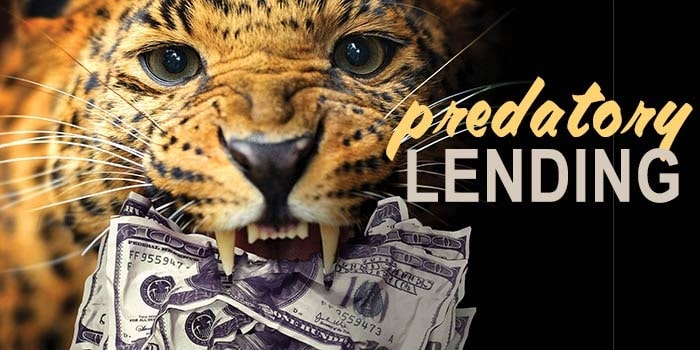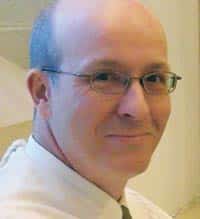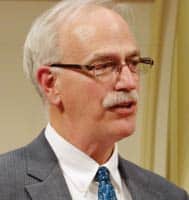
“Payday Advance.”
“No Credit Necessary.”
The signs flash on multiple blocks in nearly each community, like neon gods demanding attention and respect. The promises hide economic exploitation and political inaction. Yet in this darkness, churches are responding with an alternative message, a sign of hope.
 “Several of us were already thinking about what could be done to help the working poor in our community,” explains Danny Chisholm, senior pastor at University Heights Baptist Church in Springfield, Mo. “One Sunday I preached on Luke 4 about Jesus ‘bringing good news to the poor’ and challenged our church to think about how we could do that. As several of us attended Faith Voices of Southwest Missouri meetings, we learned about the payday loan industry and decided this would be our focus.”
“Several of us were already thinking about what could be done to help the working poor in our community,” explains Danny Chisholm, senior pastor at University Heights Baptist Church in Springfield, Mo. “One Sunday I preached on Luke 4 about Jesus ‘bringing good news to the poor’ and challenged our church to think about how we could do that. As several of us attended Faith Voices of Southwest Missouri meetings, we learned about the payday loan industry and decided this would be our focus.”
Chisholm and others from University Heights visited with politicians and urged reforms. However, the congregation also decided to take a practical action to help people in the community right away. Launching a new ministry called “University Hope,” the church created a fund in partnership with a local credit union. People trapped in the cycle of payday or car title loans can work with the church to receive a loan with a minimal interest rate. The loan pays off the payday loan debt and comes with a reasonable monthly payment that ends the debt trap.
One of the first individuals assisted by the program received a $573 loan to finally end a nearly two-year-old $500 payday loan for which the family had paid thousands of dollars in interest. Their monthly fees dropped from hundreds of dollars — for which they had to keep borrowing to pay — to just $18. Since the loans are backed by the fund created by University Heights, those receiving the loans do not need to pass a credit check. With over $20,000 given to the fund, more than 35 people have been helped by University Hope loans since its inception near the end of 2015.
 Danny Chisholm“I’ve been amazed at the response,” Chisholm said. “It’s been good to raise awareness through the media attention we’ve received. We have had other faith organizations offer support for this effort and it’s been especially gratifying to find local and city leaders recognize that payday loan companies need regulation. Our City Council recently passed a resolution to encourage the Consumer Financial Protection Bureau to pursue regulations on payday/title loan companies.”
Danny Chisholm“I’ve been amazed at the response,” Chisholm said. “It’s been good to raise awareness through the media attention we’ve received. We have had other faith organizations offer support for this effort and it’s been especially gratifying to find local and city leaders recognize that payday loan companies need regulation. Our City Council recently passed a resolution to encourage the Consumer Financial Protection Bureau to pursue regulations on payday/title loan companies.”
Earlier this year, Second Baptist Church in Liberty, Mo., launched its own program modeled on University Hope. Bob Perry, a member of University Heights who assists with the University Hope program met with leaders at Second Baptist to help them as they created “Second Hope” with more than $12,000 and a partnership with a local credit union. Both programs include a vetting process to ensure people receiving loans can repay within one year and connect loan recipients with a mentor for encouragement and budgeting guidance.
 Harold Phillips, a member of Second Baptist and a city councilman in Liberty, said he gained awareness about the problem of predatory lending through the Cooperative Baptist Fellowship’s “focus on payday lending reform as part of their advocacy focus.” Phillips, a longtime coordinator for CBF Heartland, continues to serve CBF Heartland as church benefits advocate.
Harold Phillips, a member of Second Baptist and a city councilman in Liberty, said he gained awareness about the problem of predatory lending through the Cooperative Baptist Fellowship’s “focus on payday lending reform as part of their advocacy focus.” Phillips, a longtime coordinator for CBF Heartland, continues to serve CBF Heartland as church benefits advocate.
“Our plan was simple,” Phillips explained. “With church approval, I asked about 12 people to consider making a gift that would create a collateral pool and a savings account of $6,000. We then sought out a local credit union to partner with us — we set up a savings account with them, we do the interviewing and if the team decides the person has the resources to repay the loan over time they talk with the credit union which makes the loan. We have a group of mentors and encouragers who work with each family. In that process, they may discover other ways local resources can assist the family.”
Phillips said “Second Hope is not really solving the payday loan/predatory lending problem” since “in a major way, that needs to happen with Congress in D.C. and with our elected leaders in Jefferson City.” However, he added that it “is providing an incredible help to families one at a time.”
“While Second Hope will not change the world, it is proving to be an encouraging hope for three families already,” he added. “The response to Second Hope has been positive.”
An article in the local paper in February brought both contributions to Second Hope from people in the community and inquiries from local families about receiving a loan. University Hope found similar reactions each time local media covers the ministry.
Phillips and Chisholm both hope other churches will launch similar efforts. Phillips noted that CBF Heartland set aside half of its disaster relief funds “to encourage churches to set up a program similar to University Heights and Second Baptist.” Chisholm said there are other credit unions that would be open to a partnership like the one they created for University Hope.
“It’s more than providing financial relief, it’s about getting involved in people’s lives,” Chisholm said. “There’s a lot of shame that comes with taking out payday loans and people lose hope that they will ever get out of debt. Churches can help give people regain their sense of dignity.”
“This industry is predatory in its loan practices in targeting the poor and vulnerable in our communities by charging ungodly interest rates and fees,” he added. “Churches should become more educated about the terrible impact of payday loans. It’s more of a justice issue than a political issue. I would encourage pastors to be open to this kind of work in their own communities and allow the Spirit to lead in the process.”
